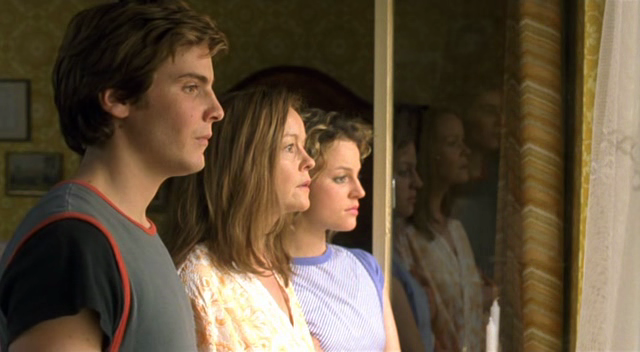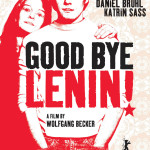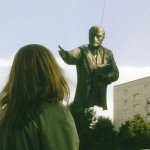My son told me Good Bye Lenin is his favourite ever German film, so that was good enough for me to buy the DVD and give it a whirl. Fact is that he likes it for the quirky tragicomic nature of the story, script and characters, without necessarily understanding the full historical context, namely that this is a film set in East Berlin at the time of the collapse of the wall, the reunification of Germany and the sweeping away of the Communist regime of the DDR under Erich Honecker, since these events came before his time and have yet to hit the history syllabuses.
For me it brings back memories of going through Checkpoint Charlie and going on a tour of East Berlin in 1986, several years before the wall came down – a haunting experience I will always remember, not least for the tension associated with a divided city. It would be an experience to return there and ask people what they think of life since the wall fell and life between the two sides was re-integrated. But the evidence here suggests that opinions are not quite as single-minded as you might expect.
This is a film about the end of an era and an exploration of cultural values, not to mention identity. At the heart of the tale is a simply but beautifully worked conceit: a mother who, since the departure of her husband has become an enthusiastic activist for the Communist government and opponent of the West, suffers a heart attack and is in a coma for 8 months.
During this time the government falls and the country is reunified on democratic (AKA “western”) principles. When she wakes, her family believe it would destroy her if the truth were revealed so instead keep up the pretence that they are still living in the old days of Honecker and the DDR, to the extent of swapping pickles into jars with the old East German brands and constructing fake news bulletins to explain changes that she starts to observe.
This becomes increasingly desperate when, for example, she spies from the window a Coca Cola banner going up on a neighbouring tower block, and when she ventures forth on her own and spots the deconstructed statue of Lenin, finger outstretched to make a point to his audience, being transported by helicopter.
There are many such comic moments along the way, but the abiding mood of the piece is melancholy, tinged with a certain ironic sadness for how the death of an ideal, albeit one riddled with flaws and inequities, and sadness for the sense of loss experienced through the family, especially when it turns out the father had remarried, moved to the west and become rich in the process.
As such, the underlying values behind life in Berlin are neatly dissected but what they reveal is a cultural ambivalence and nostalgia in Berliners that Western propaganda would have you believe was steeped in nothing but desire for freedom. Why would you want a Trabant when you could have a Merc? The answer is much more complex and subtle, and this is a movie that demonstrates the shades of loyalty and patriotism better than any account I’ve yet read or seen. As Empire magazine put it:
“An ingenious little idea that is funny, moving and—gasp!—even makes you think.”
To achieve this feat requires several key ingredients: firstly, an accurate depiction of life im Osten – and from my recollections, the atmosphere of Good Bye Lenin seems entirely authentic.
It also requires a cast that can appreciate this peculiarly German cultural issue, so I’m delighted to report that the mood of the piece is captured beautifully by the cast. At the centre is Alex Kerner, played by the Spanish born dual-nationality Daniel Brühl. Brühl has a knack of being at home in any environment, even as Niki Lauda in Rush; in this, his breakthrough role and one for which he won awards, Brühl captures the ambivalence to perfection – though he would probably not have seemed so effective were it not for Katrin Saß, an actress from the old East Germany, playing the idealised mother note-perfect.
In fact, you can’t find a bum note among any cast members, which in turn is due credit to director Wolfgang Becker for bringing to life his single-minded vision and thereby encapsulating the German East-West debate so beautifully.
So there you have it – thanks to Adam for recommending it. My life is enriched for having seen what is perhaps a minor film but one to be enjoyed as well as treated as an historical artefact. Where will the next national and cultural identity crisis emerge? At any given point there are probably dozens of them going on around the world!














When I watched this film, not only had the topic hit the history and indeed german syllabuses, but I had a full knowledge of the film’s time frame. I had an even better knowledge upon third and fourth viewings of the film about a month ago, and got a first for a presentation I did on the film and it’s historical context. Rubbish review.